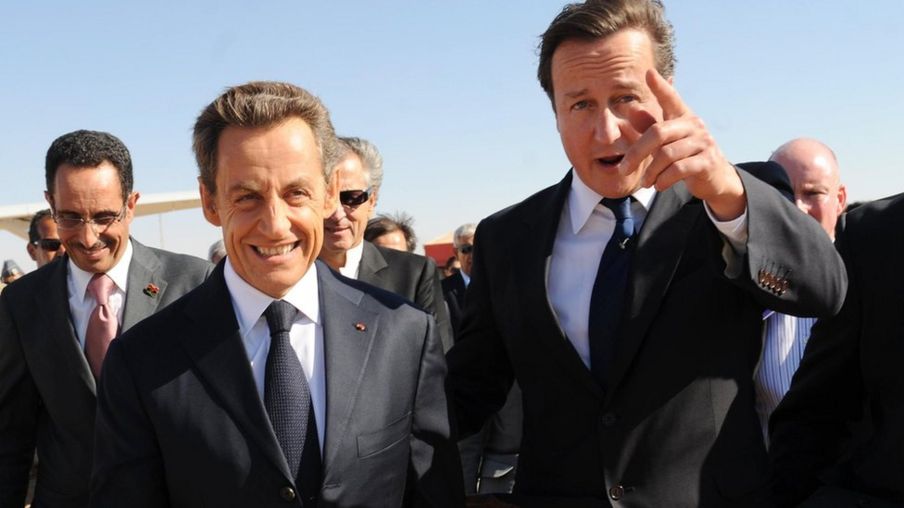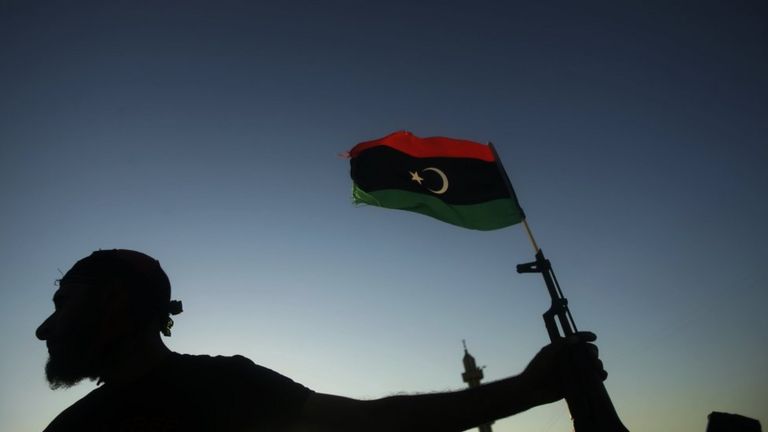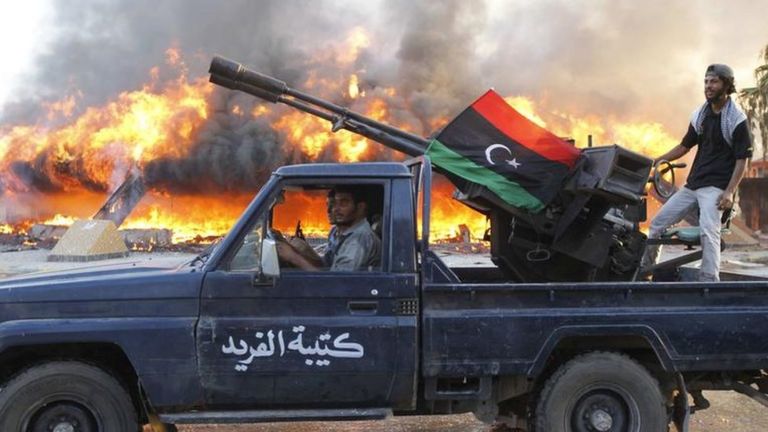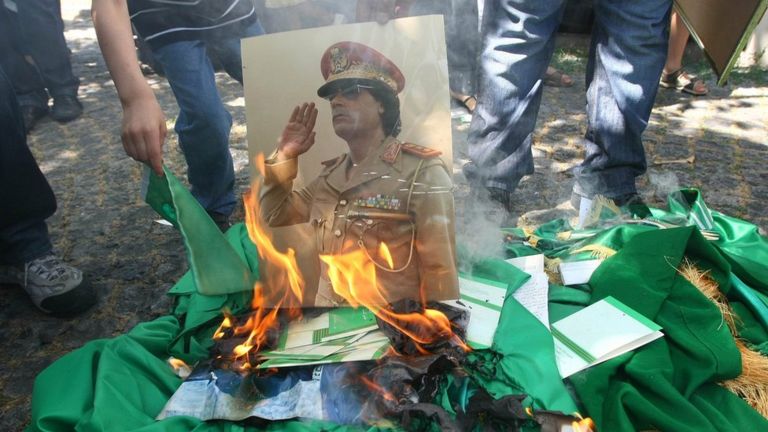Date: Wed, 14 Sep 2016 21:25:24 +0200
MPs attack Cameron over Libya 'collapse'
- Post 14 September 2016

The action had been called for by the Arab League and authorised by the UN Security Council, the Foreign Office added.
An international coalition led by Britain and France launched a campaign of air and missile strikes against Muammar Gaddafi's forces in March 2011 after the regime threatened to attack the rebel-held city of Benghazi.
But after Gaddafi was toppled, Libya descended into violence, with rival governments and the formation of hundreds of militias, while so-called Islamic State, also known as Isil and Daesh, has gained a foothold.
The committee's key conclusions include:
- Through his decision making in the National Security Council, David Cameron was ultimately responsible for the failure to develop a coherent Libya strategy
- The possibility that militant extremist groups would attempt to benefit from the rebellion should not have been the preserve of hindsight
- It saw no evidence that the UK Government carried out a proper analysis of the nature of the rebellion in Libya. UK strategy was founded on erroneous assumptions and an incomplete understanding of the evidence
- The limited intervention to protect civilians had drifted into an opportunist policy of regime change. That policy was not underpinned by a strategy to support and shape post-Gaddafi Libya
- Political engagement might have delivered civilian protection, regime change and reform at lesser cost to the UK and to Libya
- British troops should not be deployed to Libya in a training role until the Government of National Accord has established political control, stabilised internal security and made a formal request to the UK Government for such assistance, which should then be considered by the UK Parliament
Mr Cameron has defended his handling of the situation, telling MPs in January action was needed because Gaddafi "was bearing down on people in Benghazi and threatening to shoot his own people like rats".

But the foreign affairs committee said the government "failed to identify that the threat to civilians was overstated", adding that it "selectively took elements of Gaddafi's rhetoric at face value".
The government also failed to identify the "militant Islamist extremist element in the rebellion", the MPs said.
"The possibility that militant extremist groups would attempt to benefit from the rebellion should not have been the preserve of hindsight," the committee said, adding: "UK strategy was founded on erroneous assumptions and an incomplete understanding of the evidence."
Analysis, BBC diplomatic correspondent James Landale
This report is effectively Parliament's attempt at a Chilcot inquiry into the Libyan intervention, only quicker and shorter.
And the criticism is weighty: the government's poor intelligence about the threat to civilians in Benghazi, its lack of awareness of Islamist elements among the rebels, the policy drift from saving lives to getting rid of Gaddafi, and David Cameron's lack of strategy for what should happen next.
The subtext is that the lessons of Iraq were ignored.
Yet in truth the report also reveals the uncertainty among policymakers about military intervention, torn between avoiding another Srebrenica-style massacre when the West turned a blind eye to the killings of Muslims by Bosnian Serbs in 1995 and the need to avoid another Iraq-style intervention when Western countries got bogged down in an internal conflict.
What happened in Libya was a half and half policy, of intervention without occupation. And it is a model that did not work.
Crispin Blunt, chairman of the committee, told the BBC: "We were dragged along by a French enthusiasm to intervene, and the mission then moved from protecting people in Benghazi, who arguably were not at the kind of threat that was then being presented...
"Indeed, on the basis of the evidence we took, the threat to the people of Benghazi was grossly overstated."
The committee said "political options" were available once Benghazi had been secured - including through ex-PM Tony Blair's contacts with Gaddafi - but the UK government "focused exclusively on military intervention".
Timeline: Libya conflict

February 2011 - Violent protests break out in Benghazi and spread to other cities. This leads to civil war, foreign intervention and eventually the ousting and killing of Gaddafi in August.
March 2011 - UK parliament approves British participation for military intervention alongside a coalition of nations, including France and the US.
2014 - Militants from so-called Islamic State claim responsibility for several attacks in Libya towards to the end of the year, as the US finds evidence that the group is setting up training camps.
2016 - Following years of conflict, a new UN-backed "unity" government is installed in a naval base in Tripoli. It faces opposition from two rival governments and a host of militias.
By the summer of 2011, the limited intervention to protect civilians had drifted into an opportunist policy of regime change, the committee said.
"That policy was not underpinned by a strategy to support and shape post-Gaddafi Libya.
"The result was political and economic collapse, inter-militia and inter-tribal warfare, humanitarian and migrant crises, widespread human rights violations, the spread of Gaddafi regime weapons across the region and the growth of Isil in North Africa.
"Through his decision-making in the National Security Council, former prime minister David Cameron was ultimately responsible for the failure to develop a coherent Libya strategy."
The MPs said Libya had been the "first test " for the NSC, which was set up in 2010 to coordinate responses to security threats and integrate the work of various relevant government departments.
The committee said there should now be an independent review of the operation of the NSC, which is chaired by the prime minister, to see if it had succeeded in addressing the weaknesses in government decision-making identified in the run-up to the 2003 invasion of Iraq.

The Foreign Office defended the intervention.
"Muammar Gaddafi was unpredictable and he had the means and motivation to carry out his threats," a spokesman said.
"His actions could not be ignored and required decisive and collective international action. Throughout the campaign we stayed within the United Nations mandate to protect civilians.
"After four decades of Gaddafi misrule, Libya undoubtedly faces huge challenges. The UK will continue to play a leading role within the international community to support the internationally recognised Libyan Government of National Accord."
Asked whether Prime Minister Theresa May disagreed with the report's findings, Mrs May's spokeswoman said: "The PM is clear on the reasons why action was taken in Libya."
The alternative, she added, "would have been to stand by and witness another massacre of civilians".